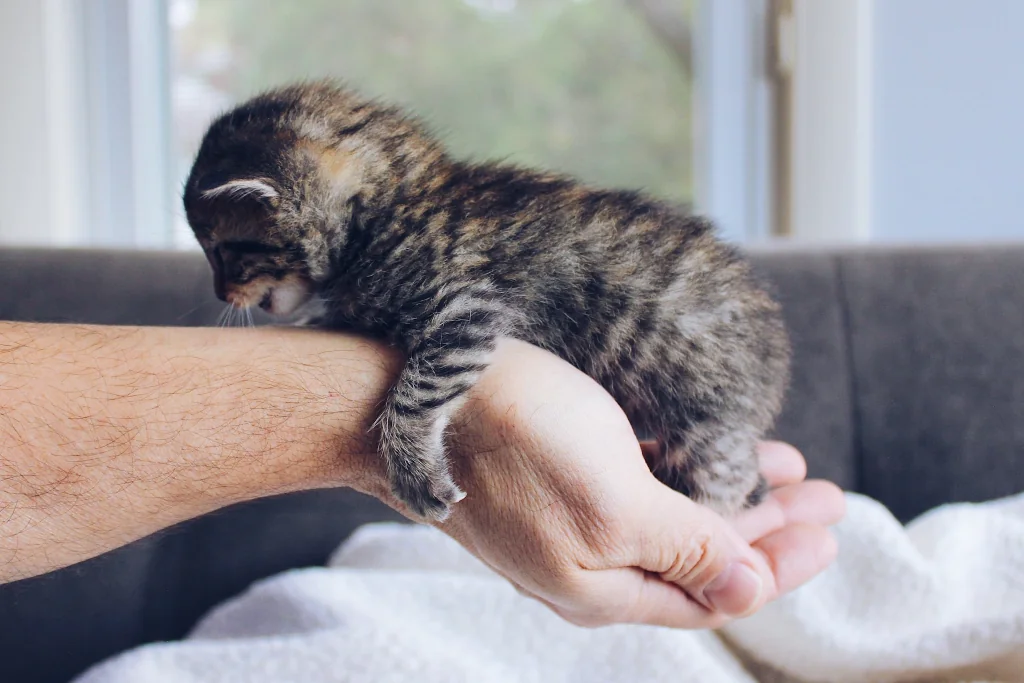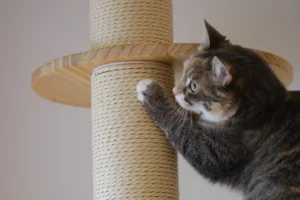Disclosure: We may earn a commission from helpful, relevant links in our content. No cost to you. See our privacy policy.
New kitten in the house? Congratulations! Now, let’s talk about that pint-sized ball of fur.
It’s full of energy one moment, then all of a sudden, it’s attacking your feet, scratching the furniture, and going off like a rocket in the middle of the night. Sound familiar?
It’s not just about the disruption to your daily routine, it’s the concern for your tiny feline friend. You wonder if they are just being kittens or if these behaviors are signs of a problem.
Good news! This blog post is your friendly guide to deciphering what’s normal, what’s not, and how to ensure your kitten grows into a well-behaved cat. Paws up if you’re ready to become a kitten whisperer!

Is My Kitten’s Behavior Normal or Abnormal?
In the delightful, chaotic world of kittens, distinguishing between normal and abnormal behaviors can sometimes be challenging.
Typical kitten behaviors include playfulness, curiosity, and a high energy level, especially at night. These behaviors are a part of their learning and growth process.
On the other hand, consistent aggression, avoidance of human contact, or excessive fear may be indicators of behavioral issues.
As we progress through this blog post, we’ll delve deeper into these behaviors to help you better understand your furry companion.
Exploring Common Kitten Behavioral Issues
Let’s dive into some typical kitten behaviors that might have you scratching your head (hopefully not from kitten claws!).
Overzealous Playtime
It’s no secret – kittens are playful. It’s part of their charm! But when your kitten’s playtime leaves you with scratches and bites, it’s time to redirect their energy.
Use toys instead of hands for play, and consider setting up a kitten-proof play area. Remember, kittens have a lot of energy to burn, so regular play sessions are crucial to prevent them from getting bored and destructive.
Just the other day, my kitten took to racing up and down the living room at top speed, leaving a wake of toppled plants. Afterward, we invested in a variety of interactive toys – the laser pointer was an instant hit!
Nocturnal Nuisance
Your kitten seems to think that night time is the perfect time to practice their Olympic sprints. This is normal as cats are crepuscular – most active during twilight.
Gradually adjust their schedule by playing with them in the evening and serving dinner a little later. It will help them sleep better during the night.
Clawing at Furniture
Scratching is a natural behavior for kittens. It helps them stretch their muscles and mark their territory. However, your furniture doesn’t have to suffer. Scratching posts and cat trees can be excellent outlets for this behavior. Use catnip to make them more appealing.
Litter Box Problems
It’s a relief when your kitten finally learns to use the litter box. But sometimes, they decide to do their business elsewhere.
If this happens, check the cleanliness of the litter box. Maybe it’s not to their liking, or perhaps it’s in a noisy area. You may even have to choose a new litter box itself or change the litter type. Adjusting these factors can make a big difference.
Remember, patience is key while dealing with kitten behaviors. You’re not just a pet parent – you’re a teacher helping them navigate their new world.

How Can I Address My Kitten’s Behavior?
Navigating through your kitten’s behavior is like solving a puzzle – each kitten is unique and so is their behavior. The trick lies in understanding their perspective and adjusting our responses accordingly. Here’s how you can address some common behaviors:
1. Biting and Scratching: Kittens explore their world through their mouth and claws, and sometimes, this results in scratches or bites. Discourage this behavior by yelping or crying out when your kitten gets too rough. They need to understand they’ve hurt you. You can also use a soft toy to gently distract them from your hands.
2. Excessive Energy at Night: Make evenings your playtime and tire your kitten out with fun activities. This will help them sleep better at night. Trust me, a well-exercised kitten is a sleepy kitten!
3. Inappropriate Scratching: If your kitten is turning your furniture into their scratching post, provide them alternatives. Cat trees, scratching posts, or cardboard boxes can work. Infuse them with a bit of catnip to attract your kitten.
4. Litter Box Training: Maintain cleanliness and privacy for the litter box. If your kitten is avoiding it, you may want to try changing the litter or the box itself. Some kittens prefer a larger box or unscented litter.
Now that you have some strategies to address your kitten’s behavior, let’s look at socialization techniques.
Helpful Techniques for Kitten Socialization
Socialization is a crucial aspect of your kitten’s development. The earlier you start, the better adjusted your kitten will be. Here’s how:
Exposure to Humans
Let your kitten interact with different people, but remember to do it gradually and positively. New faces and voices will help your kitten become more comfortable around humans.
Gentle Handling
Touch your kitten’s ears, paws, and mouth gently and regularly. This will make them more tolerant of handling, which will be beneficial during vet visits or grooming sessions.
Introducing Other Pets
If you have other pets at home, introduce them to your kitten slowly and under controlled conditions. It helps to have treats handy to reward calm behavior.
Play Dates
Organize supervised playdates with other vaccinated pets. This can be a great way to socialize your kitten.
Variety of Experiences
Expose your kitten to different environments, sounds, and experiences. Car rides, the sound of a vacuum cleaner, the buzz of the hairdryer – these experiences can help your kitten become more adaptable.
Through my years of working with kittens, I’ve found that persistence and positivity are key to successful socialization. It may take time, but your patience will be rewarded with a well-adjusted and happy cat.
Up next, we’ll look at transforming your kitten’s behavior for the long haul.
Transforming Your Kitten’s Behavior: The Road Ahead
Adjusting a kitten’s behavior isn’t a one-day task, it’s more like training for a marathon. It requires consistent effort, patience, and understanding. But the good news? It’s incredibly rewarding.
A few years ago, I adopted Smokey, a feisty gray kitten with a penchant for clawing up the curtains. As an experienced pet owner, I wasn’t surprised by his antics, but I knew I needed to address them swiftly.
Using the techniques I’ve shared here, like regular play sessions to tire him out and introducing a scratch post, I managed to help Smokey transform his behavior. It didn’t happen overnight; there were instances when I found Smokey hanging from the curtains even after weeks of training. But with consistent effort, he finally began using the scratch post. Now, he’s a well-adjusted cat who loves a good window view but stays clear of the curtains!
Transforming your kitten’s behavior may feel like a mountain to climb, but every journey starts with a single step. And remember, the effort you put in now will pave the way for a wonderful bond between you and your cat.
FAQs
Do all kittens act the same?
While certain behaviors such as scratching and biting are common across most kittens, each kitten is unique and may exhibit different behaviors based on their personality, environment, and past experiences.
Can a kitten’s diet affect its behavior?
Kitten’s diet can significantly impact their behavior. A balanced diet provides the necessary energy for a kitten’s activities. Conversely, an inappropriate diet can cause behavioral issues like hyperactivity or lethargy.
Are some breeds of cats more prone to behavioral issues?
Behavioral traits can vary significantly across different cat breeds. Individual differences, upbringing, and environmental factors play a more significant role in shaping a cat’s behavior than breed alone.
How quickly can I expect to see behavior changes after using your tips?
Behavioral changes in kittens don’t happen overnight. It may take a few weeks of consistent reinforcement for your kitten to adjust to new habits. Patience and persistence are key during this process.
Alex, a passionate animal lover, has experience in training and understanding animal behavior. As a proud pet parent to two dogs and three cats, he founded AnimalReport.net to share insights from animal experts and expand his knowledge of the animal kingdom.




